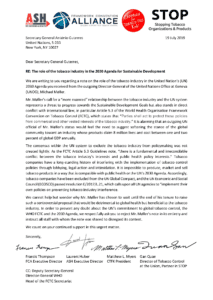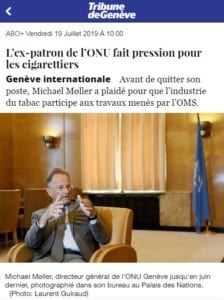Secretary General António Guterres 19 July 2019
United Nations, S-233
New York, NY 10027

Dear Secretary General Guterres,
RE: The role of the tobacco industry in the 2030 Agenda for Sustainable Development
We are writing to you regarding a note on the role of the tobacco industry in the United Nation’s (UN) 2030 Agenda you received from the outgoing Director-General of the United Nations Office at Geneva (UNOG), Michael Møller.
Mr. Møller’s call for a “more nuanced” relationship between the tobacco industry and the UN system represents a threat to progress towards the Sustainable Development Goals but also stands in direct conflict with international law, in particular Article 5.3 of the World Health Organisation Framework Convention on Tobacco Control (FCTC), which states that “Parties shall act to protect these policies from commercial and other vested interests of the tobacco industry.” It is alarming that an outgoing UN official of Mr. Møller’s status would feel the need to suggest softening the stance of the global community toward an industry whose products claim 8 million lives and cost between one and two percent of global GDP annually.

The consensus within the UN system to exclude the tobacco industry from policymaking was not created lightly. As the FCTC Article 5.3 Guidelines note, “there is a fundamental and irreconcilable conflict between the tobacco industry’s interests and public health policy interests.” Tobacco companies have a long-standing history of interfering with the implementation of tobacco control policies through lobbying, legal action and intimidation. It is impossible to produce, market and sell tobacco products in a way that is compatible with public health or the UN’s 2030 Agenda. Accordingly, tobacco companies have been excluded from the UN Global Compact, and the UN Economic and Social Council (ECOSCO) passed resolution E/2017/L.21, which calls upon all UN agencies to “implement their own policies on preventing tobacco industry interference.
We cannot help but wonder why Mr. Møller has chosen to wait until the end of his tenure to raise such a controversial proposal that would be detrimental to global health but beneficial to the tobacco industry. In order to prevent any doubt about the UN’s commitment to global tobacco control, the WHO FCTC and the 2030 Agenda, we respectfully ask you to reject Mr. Møller’s note in its entirety and instruct all staff with whom the note was shared to disregard its content.
We count on your continued support in this urgent matter.
Sincerely,
CC: Deputy Secretary-General
Director-General WHO
Head of the FCTC Secretariat





